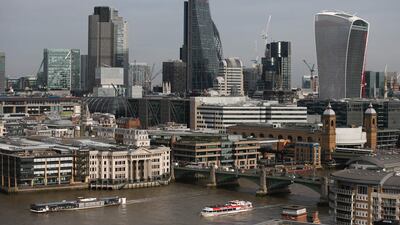It's not the usual tour of London. The tour bus might go past landmarks such as Big Ben and Buckingham Palace but they are not the main sights on the itinerary.
In a bid to expose the murky Nigerian money lurking behind some of London's most upmarket properties, anti-corruption campaigners are offering a most unusual tour of the British capital.
As the coach carrying journalists and campaigners winds through luxurious west London, experts revealed the hidden world of misused public funds, unexplained wealth and the British "enablers" who make it happen.
First stop was the multi-million pound home of "one of the biggest political movers" currently operating in Nigeria, who was named in the so-called "Panama Papers" leak that revealed the holders of offshore accounts in the tax haven.
One of the expert guides, journalist and author Oliver Bullough, said London had become the "Death Star" of global kleptocracy, which he defined as the stealing, hiding and spending of public money.
He explained that London was unique in being able to facilitate the final two steps in that process. The British capital's banking sector and overseas dependencies were able to hide dirty cash and its high-end estate agents were eager to convert the cash into properties, many of which remain empty, Mr Bullough said.
The next stop takes in a luxury flat close to Marble Arch, in the heart of central London. Another of the expert guides, former US state department intelligence expert Matthew Page, said it belonged to a political leader implicated in fuel-subsidy and bribery scandals in Nigeria.
— Neighbourhoods 'hollowed out' —
The tours are organised by anti-corruption campaigner Roman Borisovich, who has specialised in exposing shady Russian money, and they take place every few months.
Mr Borisovich said he set up the tours "to attract public attention to the enormous proportions of money laundering that is being washed through UK properties".
He said he had chosen Nigeria for the latest tour as it was "the only country that is openly asking the British government to repatriate the proceeds of crime, which were stolen from the country".
Nigeria's president Muhammadu Buhari last year called for a return of some of the estimated $37 billion (Dh135.9 billion) stolen from Nigeria that has ended up in London.
One of the stops on the tour is a multimillion pound central London flat currently at the centre of a civil lawsuit by the US Department of Justice. The US authorities believe the property was a gift to Nigerian former energy minister Diezani Alison-Madueke in exchange for an oil contract.
Ms Alison-Madueke has been implicated in bribery, fraud, misuse of public funds and money laundering cases in Britain, Italy, Nigeria and the United States.
The former president of Opec — and the first female to hold the post — she has always denied the allegations which involve billions of dollars siphoned from oil deals and state accounts.
Another luxury property on the tour is registered to the charity of a Nigerian career politician, while guides explain the intricate backroom deals between oil giants and public servants.
The mood among those on the tour takes a sombre turn as the coach passes Grenfell Tower, the west London tower block where an estimated 80 people died in a fire in June.
The luxury flat of a Nigerian businessman and academic in the very same development which rehoused the survivors of tragedy is the final stop.
"We wanted to emphasise the problem that money laundering creates in London when you have affluent areas that are becoming deserted, whole neighbourhoods are being hollowed out, while the less well-off are suffering, like in the Grenfell Tower," Mr Borisovich said.
His NGO, ClampK, is set to host more tours, with other countries such as Kazakhstan in the spotlight, and is preparing a smartphone app to allow members of the public to do their own walking tours of the capital's dirty money hotspots.

